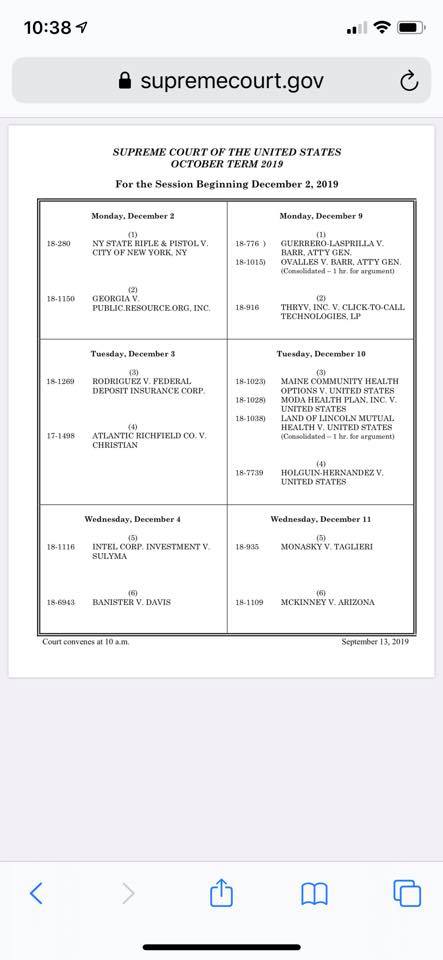The Wall Street Journal published a scathing editorial today on the Supreme Court deciding to moot NYSRPA v City of New York. I think they got it right. For a co-equal branch of government to cower before the threats of senators like Sheldon Whitehouse should be unthinkable. Unfortunately, it wasn’t.
What an enormous abdication. The Supreme Court ducked its first Second Amendment case in a decade on Monday, and the only plausible explanation is that Chief Justice John Roberts wanted to avoid becoming a target of vengeful Senate Democrats.
The editorial then takes note of Justice Alito’s dissent which was joined by Justice Gorsuch in whole and by Justice Thomas in part.
The majority buckled and ignored previous rulings to do it. As Justice Alito writes, the Court’s precedents hold that “a case ‘becomes moot only when it is impossible for a court to grant any effectual relief whatever to the prevailing party.’” Plaintiffs want to transport their firearms without worrying about getting arrested if they stop somewhere along the way. The city even admitted in oral arguments that it’s unclear whether this is allowed. Justice Alito says this and more make the rule’s violation of the Second Amendment “not a close call.”
On the mootness point, Justice Alito also pokes his colleagues with this hypothetical: “A State enacts a law providing that any woman wishing to obtain an abortion must submit certification from five doctors that the procedure is medically necessary. After a woman sues, claiming that any requirement of physician certification is unconstitutional, the State replaces its old law with a new one requiring certification by three physicians. Would the court be required to dismiss the woman’s suit?” You know the answer.
Looking at Justice Kavanaugh’s concurrence, the editorial board found it “curious”.
Justice Kavanaugh’s role here is curious because, while he joined the majority on mootness, he wrote a concurrence agreeing with the dissent on the Second Amendment merits. This looks to us as if he is trying to protect the Chief Justice from being the fifth vote, and the sole “conservative,” providing a liberal victory while making clear he’s still a solid vote himself for gun rights. The phrase for this is too clever by half.
They note that the Supreme Court has been timid on the Second Amendment and is treating it as a second class right. Moreover, if shrill threats from the Whitehouses of the world and the media can sway the Court, then we can expect it to escalate on this and other issues.
They conclude on the role of Chief Justice John Roberts.
The Chief Justice is carving out a reputation as a highly political Justice whose views on the law can be coerced with threats to the Court’s “independence.” The danger for the Court is that, in bending to these threats, the Chief is compromising the very independence he claims to want to protect.
I wish Kavanaugh was more like his fellow Georgetown Prep classmate Justice Gorsuch. I said back when Kavanaugh was selected that he wasn’t my first choice. I much preferred Tom Hardiman and Raymond Kethledge. Both had better backgrounds on the Second Amendment. Moreover, neither were Ivy League law grads which I found to be a big plus.
My only hope is that the Court does take one or more of the Second Amendment cases that are still out there awaiting cert. Ideally, they would take one of the carry cases, Mance v. Barr, and Pena v. Horan. That threesome with the correct decision would allow carry outside the home, poke holes in GCA68, and do away with the California handgun roster.

